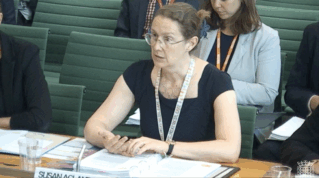Colleges up and down the country report record staffing vacancy levels. This isn’t because of an explosion in student numbers; it just reflects a growing inability to attract skilled people with so many other options to choose from. When it comes to competing for talent, the further education sector is the underdog. And while we might love an underdog, we should remember the term is defined as a competitor with little chance of winning, or someone with little status in society.
The problem will only get worse if we show our desperation. We must resist employing unsuitable people simply because students would otherwise have no teacher. If we play that game, things won’t improve.
We now have a smorgasbord of initiatives aimed at bringing in new blood. No one is against such campaigns but we must avoid undermining our profession and services. At times, it feels like we communicate that anyone from industry or commerce can simply waltz in and save us.
What we surely want is high-quality people with strong and successful technical backgrounds. Just as there is a small minority of poor teachers, there are poor plumbers, engineers, care workers, chefs and accountants. We don’t want to be the refuge of the dual-unprofessional. We don’t want to become a sector with the strapline ‘We buy any carpenter’.
While many of the initiatives have merit, they are not a coherent whole, a point well made in the recent report of the Lifelong Learning Commission. Sadly, they also tinker at the edges. The reason for our underdog status is absolutely obvious: pay.
Research on why people leave their jobs is consistent; The most common reason is to earn more. Every study shows this is true for between 50 and 70 per cent of movers. There is a reason Manchester City attracts an abundance of world-class talent and Rochdale doesn’t.
World-class technical education cannot be delivered on the cheap
Research on people’s reasons to stay is consistent too. Number one is inertia. We are fortunate that our staff feel such a sense of mission that they stay with us even when they could earn more elsewhere – in industry, schools or universities. But this commitment is being stretched to its limits. Labour markets reach an equilibrium and, once inertia and loyalty are exhausted, you get what you pay for. This is a warning we must heed now.
The latest data from HMRC shows the typical school teacher earns £39,000 – at the upper quartile for income, as you would expect for a graduate professional. In contrast, the equivalent college teacher is paid just above the median. Loyalty extracts a high price in terms of our people’s general standard of living.
Here are five suggestions for how we might respond to the staffing challenges we face.
First, make it a specific objective to improve pay in real terms. Too often, we use cuts in real-terms funding rates as a ‘computer says no’ starting point on pay negotiations. Our college has set itself this objective and made pay awards every year since incorporation.
Second, recruit newly-technically-qualified, non-experienced people. While students should enjoy learning from dual-professionals, a fair amount can be taught by those who simply know their subject. We should mirror the Teach First model.
Third, reclaim the title lecturer. Further education is not a graduate teaching profession, so we compare badly with schools if we describe ourselves as teachers. Lecturer denotes specialist experience and expertise, and is where staff derive their economic value.
Fourth, exploit the funding methodology which requires planned learning activity, not taught hours. It could help us afford to pay more if more learning was done without teacher contact.
Finally, look to bolshy sectors that stop doing things when funding isn’t fair. Farmers leave crops in the ground. Local governments close libraries. Health services let waiting lists rise. Rail operators cancel trains. We soldier on, keeping everything going. If employers and government want us to meet need but won’t pay the price, then let’s stop providing the service until they do. World-class technical education cannot be delivered on the cheap.
We can choose a better strapline. I suggest the one that served Stella Artois so well for 25 years: ‘Reassuringly expensive’.















Another thoughtful and insightful piece, as always from Ian. Hard to disagree with any of it, though the implications of his last suggestion – effectively a call to “down tools” if we don’t get the right funding to deliver the government’s technical skills agenda – would be a radical shift from our current stance as the Boxer of the government’s skills revolution to something less Animal Farm and more Mutiny on the Bounty. Tempting…On the underlying issue of pay, the report I authored ducked it partly because there is no consensus on the way forward. It’s clear to me the current pay negotiation system is broken, and I’d like to see the return of a proper national pay review system for FE, something made easier by our return to the public sector, but not all agree. Parity with school teachers’ pay is the absolutely fundamental objective if we are to avoid the dangers Ian rightly alerts us to. Maybe it is time to man the barricades!
More pay, better trained and more enthusiastic “lecturers” are the answer to how FE can become better and more popular.
The sector also needs to promote itself as a key player in helping talented people work hard and get good, well paying jobs.
To many outsiders, FE colleges are seen as the home for those students who haven’t yet made the grade, who didn’t do well with their GCSEs . The personal support FE provides to those students who have had a difficult background in education or / and have had poor health or poor parents or low support, must continue and their teachers / supporters must be well paid.
However, where possible, FE colleges should show that as well as caring for students they can educate those with talent and dedication to excel via an apprenticeship and improve their incomes without going into debt.
Sector leaders are in a tricky position, partly of their own collective making. They have not been looking out for the best interests of staff over the last decade as pay and conditions have been eroded. They should shoulder some of the blame for the situation the sector finds itself in.
Yet we still see some trojan horse style recommendations, such as:
“Fourth, exploit the funding methodology which requires planned learning activity, not taught hours. It could help us afford to pay more if more learning was done without teacher contact.”
Code for more online learning, which requires fewer staff, so those that remain can get a little bit more money! Why not go the whole hog and go fully online and automate the lot – no need for managers and Principals then, think of the money that could be saved…